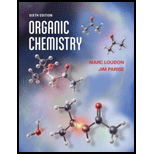
Concept explainers
(a)
Interpretation:
The structure of the polymer formed when cyclooctene is polymerized with an appropriate metathesis catalyst is to be drawn.
Concept introduction:
The process by which respective monomers combine to form
(b)
Interpretation:
The structure of the polymer formed when norbornene is polymerized with an appropriate metathesis catalyst is to be drawn.
Concept introduction:
The process by which respective monomers combine to form polymers is known as polymerization. ROMP (ring-opening metathesis polymerization) is a chain-growth polymerization in which ring-opening takes place due to strain. It is also known as olefin-metathesis.
Want to see the full answer?
Check out a sample textbook solution
Chapter 18 Solutions
Organic Chemistry
- Explain the structural formula for (C) (B) (A) in the following reaction:arrow_forwardThe odor of ripe bananas and many other fruits is due to the presence of esters. For example: Banana oil (isopentyl acetate) (a) Write the name (common or IUPAC) of the ester responsible for the fragrance of the following: pineapple, orange, apple, peach, & lavender (b) Choose one fragrant from (a) and name the alcohol and the carboxylic acid needed to synthesize this ester. (c) Show the detailed mechanism of the Fischer Esterification reaction that will be involved in the synthesis of the fragrant you have chosen in part (a).arrow_forwardStarting from bromoethane, the formation of which of the following compound requires more than one step of reaction? 2 (a) Methoxyethane (b) Ethanol (c) Ethanoic acid (d) Ethenearrow_forward
- (a) Draw a specific organic reaction for the halohydrin formation addition reaction of alkenes. (b) Also write the reagents involved in the reaction (c) and name and identify its major and minor product by writing its IUPAC name.arrow_forwardAcid-catalyzed dehydration of 2,2-dimethyl-1-hexanol gave a number of isomeric alkenes including 2-methyl-2-heptene as shown in the following equation.(a) Write a stepwise mechanism for the formation of 2-methyl-2-heptene, using curved arrows to show the flow of electrons. (b) What other alkenes do you think are formed in this reaction?arrow_forwardGive the structural chemistry of active methylene, classify it asradical/intermediate/stable organic compound, reagent of its production and role in alkylationarrow_forward
- Biphenyl has the following structure.(a) Is biphenyl a (fused) polynuclear aromatic hydrocarbon?(b) How many pi electrons are there in the two aromatic rings of biphenyl? How does this number compare with that for naphthalene?arrow_forward(a) When bromine is added to two beakers, one containing phenyl iso propyl ether and the other containing cyclohexene, the bromine color in both beakers disappears. What observation could you make while performing this test that would allow you to distinguish the alkene from the aryl ether? (b) Write any three methods in detail for the preparation of aldehyde from primary alcohol. (c) State the clemmenson reduction.arrow_forward6) Which is the organic product for the following reaction? (a) (b) (c) (d) сон COOH ОН ОН COOH COOH KMnO4 H2Oarrow_forward
- Write the structure of the major organic product formed in the reaction of each of the following with hydrogen bromide in the absence of peroxides and in their presence. (a) 1-Pentene (b) 2-Methyl-2-butene (c) 1-Methylcyclohexenearrow_forward(a) One test for the presence of an alkene is to add a smallamount of bromine, which is a red-brown liquid, and lookfor the disappearance of the red-brown color. This test doesnot work for detecting the presence of an aromatic hydrocarbon.Explain. (b) Write a series of reactions leading topara-bromoethylbenzene, beginning with benzene andusing other reagents as needed. What isomeric side productsmight also be formed?arrow_forwardA major use of Cl2 is in the manufacture of vinyl chloride,the monomer of poly(vinyl chloride). The two-step sequence forformation of vinyl chloride is depicted below.(a) Write a balanced equation for each step. (b) Write the overallequation. (c) What type of organic reaction is shown in step 1?(d) What type of organic reaction is shown in step 2? (e) If eachmolecule depicted in the initial reaction mixture represents0.15 mol of substance, what mass (in g) of vinyl chloride forms?arrow_forward
 ChemistryChemistryISBN:9781305957404Author:Steven S. Zumdahl, Susan A. Zumdahl, Donald J. DeCostePublisher:Cengage Learning
ChemistryChemistryISBN:9781305957404Author:Steven S. Zumdahl, Susan A. Zumdahl, Donald J. DeCostePublisher:Cengage Learning ChemistryChemistryISBN:9781259911156Author:Raymond Chang Dr., Jason Overby ProfessorPublisher:McGraw-Hill Education
ChemistryChemistryISBN:9781259911156Author:Raymond Chang Dr., Jason Overby ProfessorPublisher:McGraw-Hill Education Principles of Instrumental AnalysisChemistryISBN:9781305577213Author:Douglas A. Skoog, F. James Holler, Stanley R. CrouchPublisher:Cengage Learning
Principles of Instrumental AnalysisChemistryISBN:9781305577213Author:Douglas A. Skoog, F. James Holler, Stanley R. CrouchPublisher:Cengage Learning Organic ChemistryChemistryISBN:9780078021558Author:Janice Gorzynski Smith Dr.Publisher:McGraw-Hill Education
Organic ChemistryChemistryISBN:9780078021558Author:Janice Gorzynski Smith Dr.Publisher:McGraw-Hill Education Chemistry: Principles and ReactionsChemistryISBN:9781305079373Author:William L. Masterton, Cecile N. HurleyPublisher:Cengage Learning
Chemistry: Principles and ReactionsChemistryISBN:9781305079373Author:William L. Masterton, Cecile N. HurleyPublisher:Cengage Learning Elementary Principles of Chemical Processes, Bind...ChemistryISBN:9781118431221Author:Richard M. Felder, Ronald W. Rousseau, Lisa G. BullardPublisher:WILEY
Elementary Principles of Chemical Processes, Bind...ChemistryISBN:9781118431221Author:Richard M. Felder, Ronald W. Rousseau, Lisa G. BullardPublisher:WILEY





